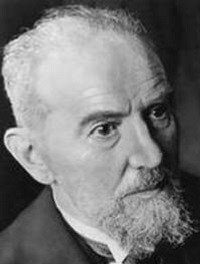William Stern: biography of this German psychologist and philosopher
In 1912, William Lewis Stern coined the concept of "intelligence quotient" for the first time in history. It was really a very innovative idea that revolutionized the educational panorama of the time, since it allowed to establish classifications among the students; in theory, to individualize his learning methods according to his abilities.
Stern's theory was already criticized at the time by psychologists such as Dr. howard gardner (1943), who argued that this classification criterion was terribly exclusive and, furthermore, inaccurate, since there were many more "intelligences" besides the one he calculated the formula of Stern. Even so, William Stern's system has gone down in history as the first method capable of accounting for a person's intellectual capacity.
In this article we bring you a biography of William Lewis Stern, one of the most interesting figures in the history of psychology.
Brief biography of William Lewis Stern, inventor of the IQ
In the autobiography that William Stern published in 1927, he commented on the three cities that had marked his existence in some way. The first, of course, Berlin, where he was born, where he began his training and completed his doctorate in Psychology (1893). It is at this university that he meets
Hermann Ebbinghaus (1850-1909), one of the first psychologists to study memory, creator of the famous "forgetting curve."The second city was Breslau, at whose university he taught from 1897 to 1916. And the third, Hamburg, where he directed the psychological institute until Hitler's rise to power in 1933.
Stern's intellectual activity was not limited only to the field of psychology. Very interested in philosophical thought and existential questions, he also received a PhD in Philosophy from Durham University.. For Stern, psychology and philosophy were two sciences that, despite the fact that they had to be developed separately, constantly nourished each other and were part of the same “battle”.
- Related article: "History of Psychology: authors and main theories"
A Jew in Nazi Germany
William Stern was born on April 29, 1871 in Berlin, just as the fearsome Franco-Prussian War was ending., which had confronted the powerful Prussia with the second French empire of Napoleon III. Not only that; that same year of 1871, in January, Berlin had been established as the capital of the new unified Germany. Stern was already born in another era, the prelude to a global conflict that would shake the world.
Prussia had become the hegemonic state of that new country, and its chancellor, the famous Otto von Bismarck, the new leader. strong that the nationalists would adore in the future and that such a great role would play in the European arms war of that end of century. In reality, the tragedy had unfolded, and the events up to Hitler's rise to power in 1933 would only be several episodes in the same drama. A drama that the Stern family did not know, could not intuit, the role it would have in their lives.
And it is that William Lewis Stern belonged to a family of German Jews, whose intellectual excellence was not taken into account when the Nazi party acceded to the levers of power. Then, much like many other Jewish intellectuals, William Stern had to flee his beloved country. He first moved to the Netherlands, but eventually sought refuge, like many of his compatriots, in the United States..
There he settled that same year of 1933 as a professor at Duke University, in North Carolina. He would never return to his native country. He passed away in 1938, leaving behind an impressive intellectual background.
- You may be interested in: "Theories of Human Intelligence"
Personalistic psychology and the creation of the intelligence quotient
William Stern was specifically interested in personalistic psychology, which emphasized the variants of each individual and, furthermore, presumed that these variants were measurable. These variants were the creators of the individual personality, that is, they interacted in the individual to form what is known as the "I".
Based on these ideas, Stern was convinced that there should be a measurement system for the intellectual capacity of each individual.. This possibility of measurement would facilitate a correct assimilation of the studies, since each child would be assigned to the educational system that corresponds to him with respect to his IQ. Thus, in 1912, Stern coined the term intelligence quotient (CI) to refer to the individual variant of intelligence of each person.
According to Stern, the intellectual quotient increases gradually in parallel with the physical development of the child, and its peak is in adolescence, a stage of hyperactivity and high cognitive motivation. From then on, the intellectual quotient enters a phase of stagnation, to begin to decline from middle age.
Based on all this, the theory that Stern proposed to calculate the individual IQ was the division of the “cognitive age” between the biological age of the individual. Cognitive age was established through standardized psychological tests. Later, in 1916, another psychologist, Lewis Terman (1877-1956), would add one more step to the formula: he proposed multiply the result of the Stern division by 100, with the objective of eliminating the decimals not necessary.

Despite the fact that both Stern and Terman are the ones that are always cited when talking about IQ, it is important to note that, before them, there were already other psychologists who tried to establish a method of measuring the individual variant of the quotient. For example, the Frenchmen Alfred Binet, a psychologist, and Théodore Simon, a psychiatrist, who, as early as 1905, published The metric scale of intelligence, where they appear, for the first time in history, a series of tests with increasing difficulty. As a curious fact, we will comment that some of the tests included in the book were "distinguishing morning from afternoon" or "showing the nose, mouth and eye".
- Related article: "Psychometry: what is it and what is it responsible for?"
A prolific author and researcher
Despite the fact that many of William Stern's contributions are a bit outdated today (we have already commented in the introduction how Howard Gardner criticizes his intelligence quotient for considering it too simplistic) the importance that Stern has for psychology is undeniable modern.
He was the author of numerous books, most of them pioneering in his field, such as those dedicated to differential psychology, intelligence testing, and even forensic psychology.. Stern is also known for his research on child psychology, a field in which he was the first to dedicate themselves, at a time when this type of psychology was not very developed. His work on the behavior and psyche of children was done closely with his wife, Clara Joseephy Stern, for the couple kept a meticulous diary on the behavior of their three children, from their infancy to adulthood.
Stern had met Clara while on a bike ride. At first, the young woman's parents opposed the courtship, since, after the death of William's father, the Stern family lived in a rather precarious situation. In fact, young William had had to give private lessons to pay for his studies and take care of his mother, who died of illness in 1896.
Adversities were no obstacle for this genius, who dedicated his entire life to the study of psychology and philosophy. History will remember him as the man who created CI, but there are many other equally interesting works by Stern that are worth discovering.

